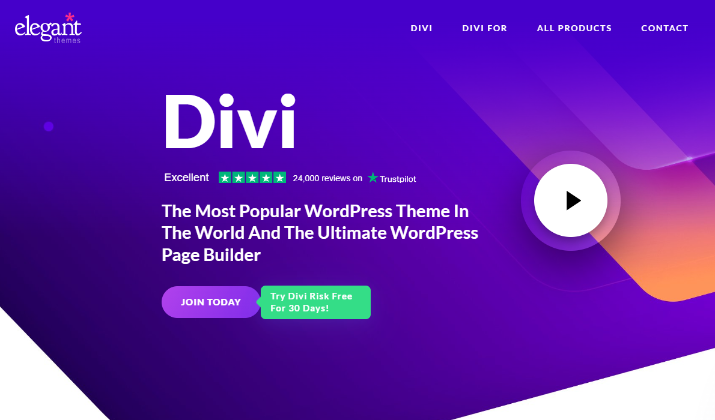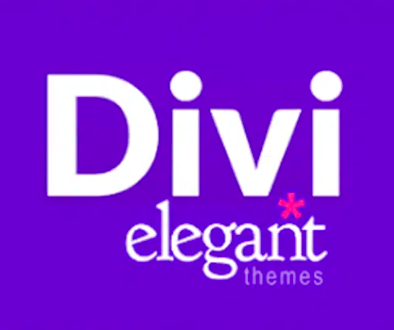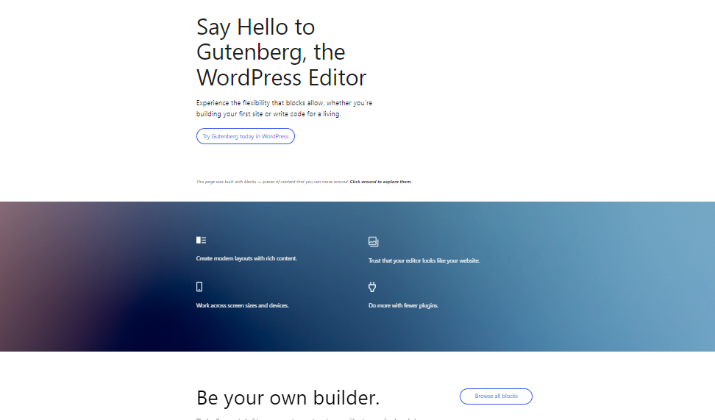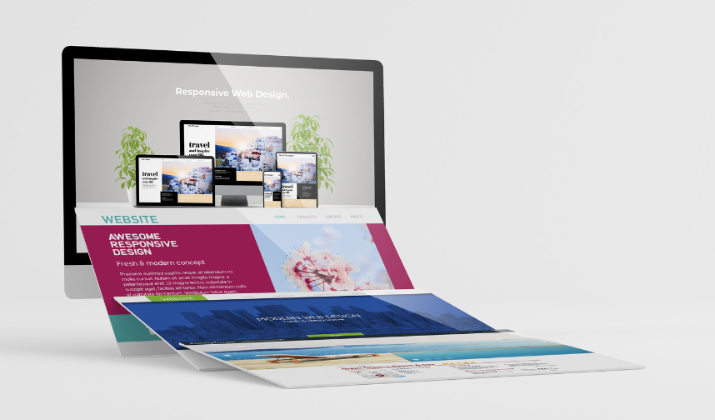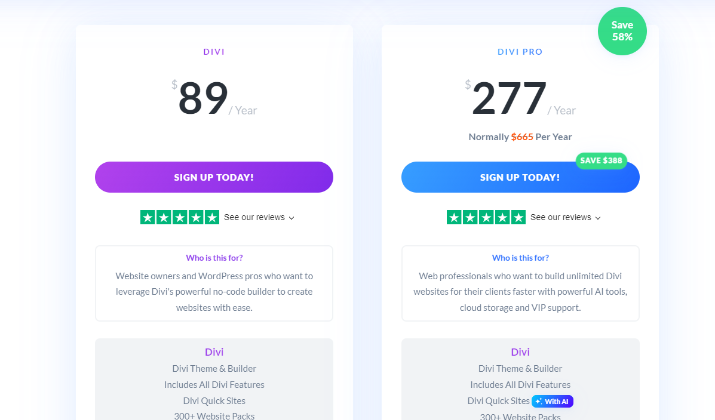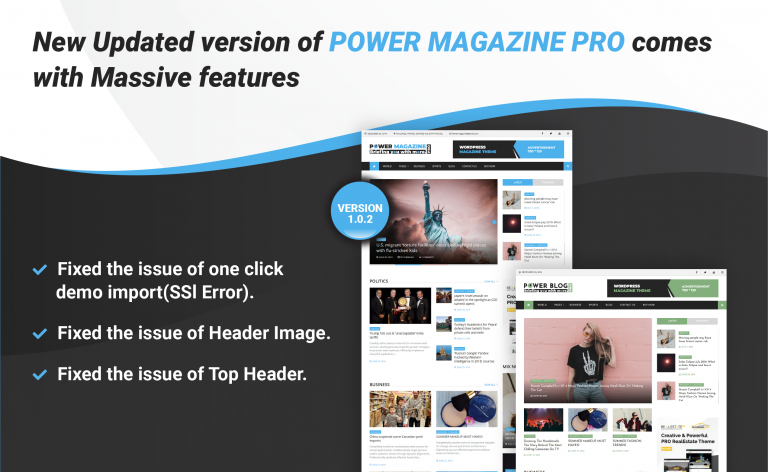When it comes to choosing the right page builder for your WordPress website design, Divi and Gutenberg are two prominent options that stand out in the long list.
Each offers unique features and capabilities, catering to different types of users—from beginners looking for simplicity to seasoned developers seeking advanced customization.
Divi, a premium page builder, is renowned for its powerful visual editing capabilities and extensive library of pre-designed templates, allowing users to create stunning websites with ease.
Gutenberg, the block-based editor introduced by WordPress, has transformed the way content is created and managed, making it easier for users to build pages using a modular approach.
In this article, we will delve into a comprehensive comparison of Divi and Gutenberg, exploring their features, usability, design flexibility, pricing, and more.
Whether you’re a blogger, a business owner, or a web developer, understanding the strengths and weaknesses of these two platforms will help you make an informed decision that aligns with your specific needs and goals.
Let’s begin!
Understanding Divi
Divi is a powerful and versatile WordPress theme and page builder developed by Elegant Themes.
It offers a user-friendly interface, extensive customization options, and a wide range of features that make it an attractive choice for both beginners and experienced web developers.
Here are five key benefits of using Divi for your website:
1. Drag-and-Drop Interface
Divi’s intuitive drag-and-drop interface allows users to easily create and customize web pages without any coding knowledge. Simply drag elements onto the page, arrange them as desired, and customize their appearance using the built-in options.
2. Visual Editing
With Divi, you can design pages in real time, with instantly visible results. The true visual editing capabilities enable you to create and customize your pages using intuitive visual controls, making the process more efficient and enjoyable.
3. Responsive Design
Divi offers complete control over how your website looks on mobile devices. The responsive editing features make it effortless to build beautiful responsive websites, ensuring your site looks great on any device.
4. Extensive Customization Options
Divi’s customization features are practically limitless. You can customize every aspect of your website, from the overall layout to individual elements, by simply clicking on the element you want to transform and choosing from the available options.
5. Regular Updates and Support
Divi’s development team consistently updates the theme to keep it compatible with the latest version of WordPress.
Additionally, Divi has a vibrant and supportive community, offering a wealth of resources, tutorials, and third-party tools to enhance your development experience.
These benefits make Divi a powerful and versatile tool for creating stunning websites across various industries, from small business websites to large ecommerce platforms
Also read: 10 Best Elegant Themes Alternatives
Trusted by over 970,000 web designers and businesses worldwide. Design beautiful websites. Quick & Easy!
Exploring Gutenberg
Gutenberg is the new block-based editor introduced in WordPress 5.0, which aims to simplify the content creation process.
It replaces the classic editor with a more intuitive and user-friendly interface, allowing users to build pages using modular blocks.
Here are the most notable benefits of using Gutenberg:
1. Block-Based Approach
Gutenberg breaks down the content into individual blocks, making it easier to add, rearrange, and customize elements such as text, images, videos, and more. This provides greater flexibility in structuring content compared to previous WordPress editors.
2. Improved User Experience
Gutenberg offers a clean and streamlined interface for content creation, with a focus on the content itself rather than the editing tools. The drag-and-drop functionality and real-time previews make the editing process more intuitive and efficient.
3. Reduced Learning Curve
Gutenberg’s user-friendly interface and block-based approach make it easier for non-technical users to create and format content without relying on developers or pre-made themes. The learning curve is relatively short, allowing users to become proficient in a matter of hours.
4. Mobile Responsiveness
Gutenberg is designed to create responsive content that looks great on any device. Users can easily preview how their content will appear on different screen sizes and make adjustments accordingly, ensuring a seamless experience across devices.
5. Extensibility
Gutenberg is highly extensible, with a growing ecosystem of plugins and themes that add new blocks and functionality. This allows users to further customize their content and create more complex layouts without relying on custom code.
These benefits make Gutenberg a powerful tool for creating engaging and visually appealing content on WordPress, catering to both beginners and experienced users alike.
User Interface & Ease of Use
Divi
Divi makes website creation easy with its drag-and-drop builder and visual interface, where users can add various modules and see the changes in real-time.
It offers an organized framework with the interface displaying all the customization tools, elements, and settings, making it easy to navigate.
Users can easily use the desired elements, customize them, and rearrange them. However, this can also be overwhelming for new users as it may take some time to understand the layout and find their way around the tool as there are too many options available.
Divi features a selection of pre-defined column layouts, making it easy to start designing the website.
Another unique feature of Divi is its wireframe mode in the user interface, which users can enable to reveal the underlying structure of the content and use it to restructure the website.
Gutenberg
Gutenberg has a clean, minimal and streamlined user interface that focuses on the basics of website creation. To add new blocks, users simply click on the ‘+’ icon and choose from a range of blocks for their website.
Once a block is added, users can click on it to open additional settings for styles, color, sizing, etc. in the right-hand sidebar.
With every element and setting available on the right side of the editing window, the navigation becomes easy and simplifies the design process.
Gutenberg is excellent for bloggers or website owners who want to build a simple, text-based website.
Customization Options
Divi
Divi provides a wealth of advanced customization options, making it a powerful tool for users seeking extensive design flexibility.
With Divi, users can drag and drop pre-designed modules onto their pages, which include a variety of elements such as text, images, sliders, and contact forms.
Each module comes with comprehensive customization settings, allowing users to adjust colors, typography, spacing, and animations.
Divi also features a built-in custom CSS editor, enabling users to add their own CSS code for more precise design tweaks.
Moreover, Divi allows for the establishment of global design settings that can be applied across the entire website, ensuring consistency in style and appearance.
The level of customization makes Divi suitable for both beginners and experienced developers who want to create visually stunning and highly functional websites.
Gutenberg
Gutenberg offers a straightforward approach to customization, providing users with a collection of various blocks to create content, including headings, paragraphs, images, videos, and galleries.
Users can click on each block to access design settings, allowing modifications such as styles, dimensions, typography, and alignment.
Additionally, Gutenberg integrates with the WordPress customizer, enabling users to make broader changes to their website’s appearance, such as colors, backgrounds, and fonts.
While Gutenberg allows for the creation of custom blocks that can be reused across multiple pages, its overall customization features are relatively limited compared to more advanced page builders.
This makes it ideal for beginners or those looking for a quick and easy way to create basic layouts without extensive design requirements.
Trusted by over 970,000 web designers and businesses worldwide. Design beautiful websites. Quick & Easy!
Performance & Speed
Divi
Divi is optimized for high speed and performance, but it is generally heavier than Gutenberg due to its extensive features and functionalities.
It employs a dynamic module framework that loads only the necessary modules for each page, which helps to prevent bloat and improve loading times.
Furthermore, Divi’s dynamic CSS ensures that only relevant CSS is loaded, further enhancing speed.
While Divi is often regarded as faster than Gutenberg, particularly for complex layouts, it may still introduce more overhead compared to the minimalist approach of Gutenberg.
Gutenberg
Gutenberg is designed to be lightweight and efficient, as it is a part of the WordPress core.
The integration ensures that it does not add unnecessary bloat to websites, which can often occur with third-party page builders.
It allows users to disable unused blocks, optimizing the site further for speed. Additionally, it employs features like load-in-line stylesheets that help enhance loading times.
As a result, sites built with Gutenberg tend to load faster and make fewer requests, leading to improved performance, especially for simpler websites or blogs.
SEO Capabilities
Divi
Divi offers a wealth of design features and functionalities, which can sometimes lead to slower loading times due to the larger codebase.
While Divi provides tools for optimizing performance, such as dynamic CSS and module loading, the extensive features can still introduce bloat that may negatively impact SEO.
Moreover, Divi’s reliance on shortcodes can complicate transitions to other content management systems, potentially affecting long-term SEO strategies.
Despite these challenges, Divi allows for the creation of visually appealing and structured websites, which can enhance user engagement—a critical factor for SEO.
Gutenberg
Gutenberg is often regarded as more SEO-friendly due to its clean coding and lightweight structure. As a part of the WordPress core, it avoids the bloat commonly associated with third-party page builders.
This streamlined approach allows for faster loading times, which is crucial for SEO, as search engines like Google prioritize sites that load quickly.
Additionally, Gutenberg does not rely on shortcodes, which can complicate content management and hinder performance. Instead, it uses pure HTML/CSS for its content blocks, making it easier to maintain and optimize for search engines.
The ability to disable unused blocks further enhances site speed, contributing positively to overall SEO performance.
Trusted by over 970,000 web designers and businesses worldwide. Design beautiful websites. Quick & Easy!
Pre-built Templates & Modules
Divi
Divi provides an extensive library of pre-built templates and modules, offering over 350 full website templates and more than 2,500 individual page layouts.
These templates are fully customizable and categorized by industry, making it easy for users to find designs that suit their specific needs, whether for a blog, ecommerce site, or corporate website.
The availability of such a vast selection allows users to quickly set up their sites with high-quality designs, significantly reducing the time and effort required for layout creation.
Additionally, Divi’s drag-and-drop interface enables users to easily modify these templates, ensuring that they can align the designs with their branding and preferences.
Gutenberg
In contrast, Gutenberg does not offer a built-in library of pre-built templates.
Instead, it focuses on a block-based approach that allows users to create pages from scratch using various content blocks, such as headings, paragraphs, images, and galleries.
While Gutenberg’s flexibility allows users to design custom layouts, it may require more effort and creativity, particularly for those who prefer ready-made solutions.
However, users can save their custom block arrangements as templates for future use, providing some level of reusability.
Although Gutenberg lacks the extensive template library found in Divi, it offers a more straightforward way to create unique website designs tailored to individual preferences.
Integration & Compatibility
Divi
Divi, developed by Elegant Themes, has made significant strides in integrating with Gutenberg.
The latest versions of Divi allow users to switch between the Divi Builder and Gutenberg easily, providing flexibility in how content is created and managed.
The introduction of the Divi Layout Block enables users to incorporate Divi layouts directly within the Gutenberg editor, allowing for a mix of Divi modules and Gutenberg blocks on the same page.
This integration means that users are no longer forced to choose between the two builders; they can leverage the strengths of both to achieve their desired results.
However, while Divi is compatible with Gutenberg, it may not always provide the same level of seamless interaction as native Gutenberg blocks, and some users may encounter limitations when trying to combine features from both systems.
Gutenberg
Gutenberg, being the default block-based editor introduced in WordPress 5.0, is designed to work seamlessly within the WordPress ecosystem.
It allows for easy integration with various themes and plugins, ensuring that users can create content without compatibility issues.
Gutenberg’s block system is flexible, enabling developers to create custom blocks that enhance functionality and user experience.
As a core part of WordPress, Gutenberg is regularly updated alongside WordPress itself, ensuring ongoing compatibility with the latest features and security updates.
Check out: Divi vs Blocksy
Trusted by over 970,000 web designers and businesses worldwide. Design beautiful websites. Quick & Easy!
Community & Support
Divi
Divi has a massive and enthusiastic community of users, developers, and designers who actively engage with each other and the Elegant Themes team.
The Divi community offers a wealth of resources, including tutorials, documentation, and third-party tools to enhance the Divi experience.
Elegant Themes provides 24/7 live chat support, making it easy for users to get help quickly. The company also offers preset questions and a comprehensive ‘Help’ section that connects users to documentation, tutorials, and FAQs.
Divi has a strong social media presence, with a vibrant Facebook community where users can chat, share ideas, and help each other out.
Divi also organizes ‘Divi Meetups’ that allow users to connect with the Divi community worldwide.
Gutenberg
While Gutenberg has a growing community, it lacks the dedicated and enthusiastic following that Divi enjoys. It relies on the broader WordPress community for support and resources.
The support for Gutenberg is primarily provided through the WordPress support forums, where users must create topics and wait for responses.
The documentation for Gutenberg is available through WordPress.org, including ‘how-to’ guides, FAQs, and tutorials.
Read this too: Divi vs Flatsome
Pricing & Value for Money
Divi
Divi operates on a subscription-based model, offering two main pricing plans.
The yearly access plan costs $89, while a one-time payment of $249 gives users lifetime access to the theme and its updates.
Both plans provide access to all Divi features, including premium support and a wide array of pre-built templates and modules.
Also read: Divi Theme Coupon Code
Trusted by over 970,000 web designers and businesses worldwide. Design beautiful websites. Quick & Easy!
Gutenberg
Gutenberg is completely free to use, as it is integrated into the WordPress core. This means that users can create and manage their websites without incurring any additional costs for the editor itself.
While users may choose to invest in premium themes or plugins to enhance Gutenberg’s functionality, the basic block editor remains cost-free.
This makes Gutenberg an attractive option for individuals or small businesses looking to minimize expenses while still having access to a powerful content creation tool.
While Divi’s pricing may seem higher than Gutenberg’s free offering, it brings a wealth of advanced features and customization options that can justify the cost for users seeking a more robust design experience.
Explore: Elegant Themes Free Trial
Use Cases
Divi
Divi is best suited for users who seek extensive design flexibility and advanced customization options.
It is particularly advantageous for web designers and developers who want complete control over every aspect of their site’s appearance.
The visual drag-and-drop interface makes Divi an excellent choice for businesses that require unique branding and a professional online presence, such as ecommerce sites, portfolios, and service-based businesses.
Additionally, Divi is ideal for users who value pre-built templates and modules, as it offers a vast library of full website templates and individual page layouts.
Furthermore, Divi’s advanced features, such as A/B testing and extensive WooCommerce compatibility, make it a powerful tool for those looking to optimize online sales and marketing strategies.
Gutenberg
Gutenberg is an excellent choice for users looking for a straightforward and efficient content creation experience.
It is particularly well-suited for bloggers and individuals who want to create simple, text-based pages without the need for extensive design elements.
The block-based approach allows users to easily add and rearrange content blocks, making it ideal for those who prioritize ease of use and quick setup.
Additionally, Gutenberg is a great option for users who are working with limited budgets, as it is completely free to use as part of the WordPress core.
Another scenario where Gutenberg shines is for users who prefer a minimalist design aesthetic.
Its clean interface and focus on content allow for a distraction-free writing environment, making it easier to concentrate on the message rather than the design.
Conclusion
Gutenberg stands out for its simplicity, cost-effectiveness, and seamless integration with the WordPress ecosystem, making it an ideal choice for bloggers, small businesses, and those who prioritize a straightforward content creation experience.
On the other side, Divi excels in providing extensive design flexibility, advanced customization options, and a rich library of pre-built templates and modules.
It is particularly well-suited for web designers, developers, and businesses seeking to create visually striking websites with intricate layouts.
Consider your needs and specific requirements to make a choice. We found both the tools good in their own respect.

